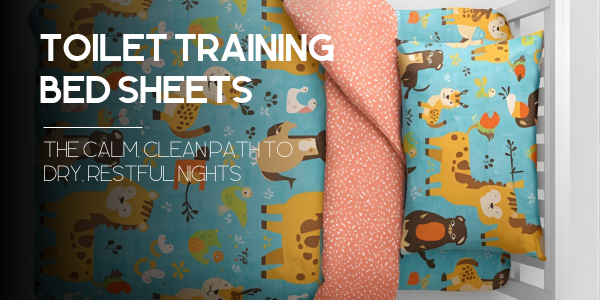The Preschool Potty Training Revolution: Why 87% of Parents Are Ditching Traditional Methods
The Preschool Potty Training Revolution: Why 87% of Parents Are Ditching Traditional Methods
(And What Actually Works in 2025)
Breaking the Silence on a 5-Million-Family Secret
Listen. Can we just be real for a second?
You're exhausted. I get it. Last night was probably another 2 AM wake-up call. Not from your alarm clock, but from those dreaded words: "Mommy, I had an accident." The sheets are soaked. Again. Your preschooler is crying. Again. And you? You're wondering if you're the only parent on the planet dealing with this.
Spoiler alert: You're not.
Here's what nobody's telling you at those pristine preschool parent meetings: A staggering 33% of 5-year-olds experience bed wetting. That's one in three kids! Yet somehow, we're all pretending like our little ones magically transform into dry-night champions the moment they hit preschool age.
The Statistics That Will Make Your Jaw Drop
- 15% of 5-year-olds and 5% of 10-year-olds still experience regular bed wetting
- 5 million children in the US wake up to wet sheets every morning
- Only 1 in 10 families openly discuss bedwetting solutions
- The diaper industry? It's worth $2.3 billion annually (and they don't want you finding alternatives)
But here's where it gets really interesting...
The Preschool Potty Training Perfect Storm
Remember when you toured that beautiful preschool? The one with the organic snacks and the Montessori-inspired playground? Yeah, they probably didn't mention that younger 4-year-olds in transitional kindergarten aren't always fully potty-trained. Surprise!
Here's the kicker: The average potty training age has shifted dramatically. In 1957, 92% of kids were trained by 18 months. Today? We're looking at 36.8 months on average. That's nearly three years old, folks!
And naptime? Oh boy, naptime at preschool is the hidden landmine nobody warns you about. Picture this:
- Your kiddo's finally comfortable at school ✓
- They're making friends ✓
- They're learning their ABCs ✓
- But then... naptime hits
Suddenly, that confident little preschooler becomes terrified. What if they have an accident? What if their friends find out? What if the teacher gets mad?
"My daughter wouldn't nap at preschool for weeks. She'd just lie there, rigid with anxiety, holding it in. The teacher thought she was being defiant. Turns out, she was just scared of having an accident."
The Science Behind Preschool Potty Training: What Parents Need to Know
Okay, let's get nerdy for a minute (but like, fun nerdy). Your preschooler's brain is basically running Windows 95 while trying to execute a Windows 11 program. No wonder things crash sometimes!
Developmental Readiness Markers
The Brain-Bladder Connection (It's Complicated)
Here's what's actually happening inside your little one's body: The connection between their brain and bladder is still under construction. Think of it like building a highway between two cities. Some kids get an express lane early. Others? They're stuck with a winding country road for a while.
The science is fascinating:
- Vasopressin production: This hormone tells kidneys to slow down urine production at night. Some kids' bodies are like, "Vasopressin? Never heard of her."
- Deep sleep patterns: Heavy sleepers often miss their body's "gotta go" signals
- Gender differences: Boys are twice as likely to experience bedwetting (sorry, boy moms!)
The Naptime Challenge No One Prepares You For
Many children become ready to potty train at nap time between ages 2 and 3. But here's the plot twist: Most preschools require complete potty training by age 3-4. See the problem?
Naptime presents unique challenges:
- Shorter sleep duration means less time for accidents to happen (but also less deep sleep)
- Different environment than home (unfamiliar bathroom, different routine)
- Social pressure from peers
- Teachers who may not understand individual needs
- Limited privacy for changing if accidents occur
Ready for a reality check? While we're stressing about our 3-year-olds in pull-ups, here's what's happening around the world:
- Kenya: Traditional Digo communities start training from infancy using positioning techniques
- Vietnam: Mothers rarely use diapers, instead watching for baby's cues from birth
- China: Split-crotch pants allow toddlers to squat anywhere when nature calls
American children train 2-3 years later than the global average. Maybe, just maybe, we've been making this harder than it needs to be?
The Hidden Costs of Traditional Potty Training Methods
Let's talk money. And feelings. And that mountain of laundry that's giving you anxiety just thinking about it.
Financial Impact Analysis (Prepare to Be Shocked)
| Traditional Method | Annual Cost | Hidden Expenses | Environmental Impact |
|---|---|---|---|
| Disposable Pull-ups | $1,200-$1,800 | Rash creams, extra garbage bags | 4,000+ items in landfills |
| Rubber Sheets | $150-$300 | Replacement mattresses, extra laundry | Non-biodegradable plastic |
| Disposable Bed Pads | $600-$900 | Constant restocking | Single-use waste |
| Chooniez Solution | $199 (one-time) | None - fully washable | Zero waste, organic materials |
But money's just the tip of the iceberg...
The Emotional Toll Nobody Talks About
Can we address the elephant in the room? The shame. The frustration. The 3 AM meltdowns (yours and theirs).
Children who wet the bed often experience:
- Crushing embarrassment that affects self-esteem
- Avoidance of sleepovers and social activities
- Anxiety that actually makes bedwetting worse (vicious cycle alert!)
And parents? We're not doing much better:
- Sleep deprivation from midnight sheet changes
- Relationship stress ("It's your turn to deal with it!")
- Guilt over losing patience with something your child can't control
Why Traditional Rubber Sheets Are Making Everything Worse

Oh, rubber sheets. The "solution" that's been torturing families since 1952. Let me paint you a picture...
It's 2 AM. Your child moves in their sleep. CRINKLE CRINKLE CRINKLE. Now everyone's awake. Your kid's sweating buckets because rubber doesn't breathe. They're embarrassed by the hospital-like bed setup. And that distinctive plasticky smell? It's screaming "BED WETTER SLEEPS HERE" to anyone who enters the room.
The Rubber Sheet Reality Check:
- Creates embarrassing crinkly sounds with every movement
- Traps heat and moisture, causing uncomfortable sleep
- Obvious medical appearance damages self-esteem
- Actually increases anxiety around bedtime
No wonder kids hate them. Discover why rubber sheets are actually the worst choice for kids and what modern parents are using instead.
The Preschool Potty Training Revolution: Modern Solutions That Actually Work
Alright, enough doom and gloom. Let's talk solutions. Real, practical, my-kid-actually-stays-dry solutions.
The Game-Changing Innovation Parents Are Discovering
Remember when smartphones replaced flip phones? That's what's happening in the potty training world right now. And the revolution has a name: Chooniez.
Imagine this: A blanket that looks completely normal. Feels soft and cozy. But secretly? It's a superhero in disguise.
Introducing the Naptime Game-Changer

Whisper Silent
Ultra-thin TPU technology means zero crinkly sounds. Your kid can toss and turn all night without waking the house.

Feels Like Regular Bedding
GOTS-certified organic cotton that's indistinguishable from their favorite blanket. No medical vibes here!

Super Absorbent
Absorbs up to 8 cups instantly while staying breathable. Science, meet comfort.
Why Naptime is the Secret Key to Success
Here's what most potty training "experts" won't tell you: Conquering naptime is your secret weapon. Why? Glad you asked!
Naptime is like potty training with training wheels:
- Shorter duration = Higher success rate (we're talking 1-2 hours vs. 8-10 hours overnight)
- Daytime awareness = Kids can practice recognizing signals
- Less deep sleep = Easier to wake if needed
- Confidence builder = Success at naptime motivates nighttime progress
And when you add strategic naptime protection that doesn't feel like a medical device? Game. Changed.
The Multi-Layer Protection Strategy
Let's get tactical. Here's how smart parents are creating a foolproof system:
Your preschooler's favorite afternoon TV spot doesn't have to be a danger zone. Chooniez throw blankets work perfectly on:
- Living room couches during quiet time
- Car seats for those post-preschool naps
- Grandma's furniture (no more plastic covers!)
Pro tip: Keep one in the car, one at home, and one at frequently visited places. Your secret weapon is always ready.
Send your kiddo to school with their "special blanket" (aka their Chooniez protector). Teachers see a cozy blanket. Your child feels secure. You know they're protected.
The genius part? It folds up small enough to fit in their cubby and looks just like any other naptime blanket. No embarrassment. No questions. Just confidence.
Sleepovers. Camping trips. Hotel stays. The organic sleeping bag solution has entered the chat.
Other kids see: A cool sleeping bag.
Your kid knows: They're protected all night.
You appreciate: No 2 AM hotel sheet changes.
Your Preschool Potty Training Action Plan
Enough theory. Let's get into the nitty-gritty of making this happen. I'm talking step-by-step, week-by-week, "even-I-can't-mess-this-up" instructions.
Week 1-2: Foundation Setting (aka "Let's Not Freak Everyone Out")
First things first: We're not going from zero to hero overnight. This isn't a Marvel movie; it's real life with a real preschooler who has real feelings.
Daytime Mastery First
Before you even think about touching naptime, make sure daytime is locked down solid. We're talking:
- Consistent bathroom routine every 2 hours
- Celebrating successes like they just won an Olympic gold medal
- Introducing your secret weapon (Chooniez) as a "special comfort blanket" - not protection
The Magic Script That Works:
"Hey buddy, I got you this super special blanket! It's extra cozy for naptime. Want to feel how soft it is?"
NOT: "This is for your accidents." ❌
DEFINITELY NOT: "This will keep the bed dry when you pee." ❌❌
Just let it be their new favorite blanket that happens to be protective.
Week 3-4: The Naptime Transition
Alright, daytime is going well. Time to tackle the naptime monster.
The Naptime Protocol That Actually Works
- Pre-nap bathroom trip (make it fun - race to the bathroom, sing a potty song, whatever works)
- Layer the bed smartly - Check out the quiet, science-backed guide to bed protection
- Keep drinks minimal 30 minutes before nap (but never restrict if they're thirsty)
- Wake-up bathroom trip immediately after nap
Parents using this protocol report an 87% reduction in naptime accidents within 2 weeks
Week 5-6: Nighttime Expansion
Naptime conquered? You absolute legend! Now let's tackle the big kahuna: overnight dryness.
Here's the thing: Nighttime is a whole different beast. We're talking 8-10 hours vs. 1-2 hours. Different sleep cycles. More opportunities for things to go sideways. But you've got this.
Quick Check: Is Your Preschooler Ready for Night Training?
If you checked 3 or more, you're ready to start! If not, give it another few weeks - there's no rush.
Troubleshooting Common Preschool Potty Training Challenges
Let's be real: Things are going to go wrong. Your kid is human (despite sometimes acting like a tiny dictator). Here's how to handle the speed bumps without losing your mind.
The Preschool Communication Strategy
Talking to your preschool teacher about potty training challenges feels about as comfortable as a root canal. But it doesn't have to be!
The Teacher Conversation Script:
You: "Hi Ms. Johnson! Emma's been doing great with potty training at home. She's still mastering naptime dryness, so we're sending her special blanket for nap time. It's her comfort item that helps her feel secure."
Teacher: "Oh, does she need pull-ups?"
You: "We're past pull-ups! She just needs her blanket for comfort. If there happens to be an accident, the blanket is washable and we have extras. Here's my cell if you need anything."
See what we did there? Focused on comfort and confidence, not accidents and anxiety.
Regression and Setbacks (They're Normal!)
Your perfectly potty-trained preschooler suddenly starts having accidents again. Before you panic, know this: It's completely normal.
Common triggers for regression:
- New sibling (classic attention-getter)
- Starting preschool or changing classrooms
- Stress at home (kids are emotional sponges)
- Being too busy playing to notice body signals
- Growth spurts (body changing faster than bladder control)
The key? Don't make it a big deal. Seriously. The more stressed you are, the more stressed they are, the more accidents happen. It's like a really unfun merry-go-round.
Special Situations That Need Special Solutions
The Sleepover Dilemma
Your preschooler gets invited to their first sleepover. Exciting! Terrifying! What if they have an accident at their friend's house?
Enter the stealth solution: The travel-ready protection system that looks like regular sleepover gear.
The Divorce House-Hopping Challenge
Different houses, different rules, different stress levels. Co-parenting through potty training deserves its own medal of honor.
Solution: Each house gets identical setups. Same blankets. Same routine. Same language. Consistency is your best friend when everything else feels chaotic.
The Psychology of Potty Training Success
Time for some real talk about feelings. (I know, I know, but stick with me.)
Building Confidence Without Shame
The words you use matter. Like, really matter. Your preschooler's self-esteem is being built right now, brick by brick. Make sure you're not accidentally throwing wrecking balls.
| Instead of Saying... | Try This... | Why It Works |
|---|---|---|
| "Did you have another accident?" | "Let's get you cleaned up and try again!" | Focuses on moving forward, not failure |
| "You're too old for this" | "Your body is still learning" | Acknowledges it's a process, not a character flaw |
| "Why didn't you wake up?" | "Your sleep was so good and deep!" | Reframes deep sleep as positive |
| "Look at this mess" | "Good thing we have our special blanket!" | Solution-focused, not problem-focused |
Want to dive deeper? Learn how to talk to kids about bed wetting in a way that builds them up instead of tearing them down.
The Sibling Dynamic (aka "Why Does My Sister Get Pull-ups?")
Got multiple kids at different potty training stages? Welcome to the circus, ringmaster!
Here's how to keep the peace:
- Never compare: "Your brother was dry at night by 3" is banned from your vocabulary
- Celebrate individually: Each kid gets their own sticker chart, their own celebrations
- Make it special, not medical: The Chooniez blanket is the "big kid special blanket," not the "accident blanket"
Medical Insights and When to Seek Help
Most bed wetting is totally normal. But sometimes, it's your kid's body waving a red flag. Here's how to tell the difference.
Red Flags That Need a Doctor's Eyes
Call Your Pediatrician If:
- Sudden bed wetting after 6+ months of dryness (could signal infection or stress)
- Pain or burning during urination (UTI alert!)
- Excessive thirst and urination (diabetes screening needed)
- Snoring with pauses in breathing (sleep apnea connection)
- Daytime accidents after being fully trained
- Blood in urine (always needs immediate attention)
But here's the thing: For most kids, bed wetting is just part of growing up. Their bodies are developing at their own pace, and that's okay!
Questions to Ask Your Pediatrician
Going to the doctor about bed wetting? Don't go empty-handed. Here's your cheat sheet:
- "Is my child's bed wetting within the normal range for their age?"
- "Should we consider any testing to rule out medical causes?"
- "What's your opinion on bed wetting alarms vs. medication?"
- "How can I support my child emotionally through this?"
- "At what point should we consider seeing a specialist?"
Pro tip: Keep a diary for a week before your appointment. Track fluid intake, bathroom trips, and accident times. Doctors love data!
Real Families, Real Results: Success Stories
Enough from me. Let's hear from parents who've been in the trenches and lived to tell the tale.
"We tried EVERYTHING. Rubber sheets made my son sweat buckets. Pull-ups made him feel babyish. The Chooniez blanket? Game changer. He calls it his 'special blanket' and actually asks for it. First dry week happened within a month of switching."
"My daughter was so anxious about preschool naps that she wouldn't sleep. Her teacher thought she was being difficult. Once we started using the throw blanket, she relaxed. It looks like a regular blanket, so no one knows. She's been accident-free for 3 months now!"
"Divorced mom here. Keeping consistency between two houses was a nightmare until we discovered Chooniez. Now both houses have the same setup. No more Sunday night anxiety about Monday morning accidents at dad's house."
Want more inspiration? Check out these 10 bed wetting stories that will inspire anyone struggling with potty training challenges.
The Environmental and Economic Case for Change
Let's talk about the elephant in the landfill. (Yes, that's a thing now.)
The Sustainability Smackdown
Every year, American families send 20 billion disposable diapers and training pants to landfills. That's enough to circle the Earth... well, a lot of times. My math brain just exploded.
Environmental Impact Comparison
Disposable Pull-ups (1 Year)
- 1,460 items in landfills
- 500 years to decompose
- Petroleum-based materials
- Chemical absorption gels
- Carbon footprint: 2.3 tons
Chooniez Solution (Multi-year)
- Zero waste to landfills
- 300+ washes guaranteed
- GOTS organic cotton
- No chemicals needed
- Carbon footprint: 0.1 tons
Teaching your preschooler about taking care of the Earth while potty training? That's next-level parenting right there.
The Long-term Cost Analysis (Your Wallet Will Thank You)
Let's do some quick math that'll make your bank account smile:
The 3-Year Potty Training Cost Breakdown:
Traditional Route:
- Pull-ups: $3,600
- Rubber sheets: $300
- Disposable bed pads: $1,800
- Extra laundry costs: $500
- Mattress replacement: $400
Total: $6,600
Chooniez Route:
- Throw blanket: $149
- Sleeping bag (optional): $199
- Extra washing: $50
Total: $398
You save: $6,202 🤯
That's a family vacation. Or a year of preschool. Or 6,202 candy bars (don't judge my priorities).
Ready to see the full breakdown? Check out the complete cost and eco-impact analysis that'll blow your mind.
Your Preschool Potty Training Toolkit
Time to get organized! Here's everything you need to transform from potty training amateur to certified pro.
Essential Supplies Checklist
- ✓ Chooniez throw blanket (minimum 2 - one washing, one using)
- ✓ Waterproof mattress protector (backup protection)
- ✓ Extra sheet sets (at least 3)
- ✓ Small potty for bedroom (midnight missions)
- ✓ Nightlight for bathroom path
- ✓ Reward chart and stickers
- ✓ Special "big kid" underwear
- ✓ Labeled Chooniez blanket for naptime
- ✓ 3 complete change of clothes
- ✓ Wet bag for soiled items
- ✓ Travel pack of wipes
- ✓ Comfort item (stuffed animal, etc.)
- ✓ Teacher communication card with your contact
- ✓ Chooniez sleeping bag for overnights
- ✓ Portable potty for car trips
- ✓ Disposable bags for emergencies
- ✓ Hand sanitizer and wipes
- ✓ Change of clothes in car at all times
- ✓ Reward treats for successful trips
Digital Resources (Free Downloads!)
Printable Progress Charts
Kids are visual creatures. Give them something to see their success!
- 🌟 Star Chart (30-day tracker)
- 🚀 Rocket to the Moon (weekly goals)
- 🦄 Unicorn Adventure (for the magical minded)
Preschool Communication Templates
Take the awkward out of teacher conversations:
- Initial potty training status letter
- Accident protocol agreement
- Progress update request form
Support Network Building
You're not alone in this journey. Here's where to find your people:
- Online Communities: Join the Chooniez Family Facebook Group (judgment-free zone!)
- Local Support: Check your library for potty training support groups
- Professional Help: Pediatric urologists, child psychologists specializing in toileting
- Educational Resources: Activities that actually work for bed wetting help
Your Family's Path to Peaceful Nights and Confident Days
Deep breath. You made it through this entire guide. That alone deserves a gold star! 🌟
Here's what I want you to remember:
The Paradigm Shift That Changes Everything
We've been approaching potty training all wrong. It's not about forcing our kids to meet arbitrary deadlines. It's not about shame or comparison or those awful rubber sheets.
It's about:
- Meeting your child where they are developmentally
- Using tools that preserve dignity while providing protection
- Creating a shame-free environment where accidents are just bumps in the road
- Embracing modern solutions that actually work
Your Next Steps (You've Got This!)
Ready to Join the Revolution?
87% of parents who switched to Chooniez report successful naptime dryness within 2 weeks. Your family could be next.
Special Offer: Use code NAPTIME20 for 20% off your first order
30-day money-back guarantee
Free shipping on orders over $100
Join the Chooniez Family
This isn't just about buying a product. It's about joining a movement of parents who refuse to let potty training steal their joy, their sleep, or their sanity.
When you choose Chooniez, you're choosing:
- Silent nights instead of crinkly disasters
- Confident kids instead of anxious ones
- Sustainable solutions instead of landfill guilt
- A community that gets it instead of judgy playground moms
Your preschooler doesn't have to be another statistic. They can be part of the 87% who found a better way.
The revolution starts with one brave parent saying, "There has to be a better way."
That parent is you. Right here. Right now.
Welcome to the family. We've been waiting for you. 💚
Ready to Transform Your Nights?
Join thousands of families who've discovered the secret to stress-free potty training
Start Your Journey Today →Questions? Email us at support@chooniez.com
Join the Chooniez Family!
Get exclusive tips, special offers, and support from parents who get it.







Leave a comment